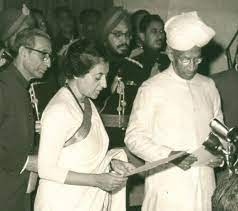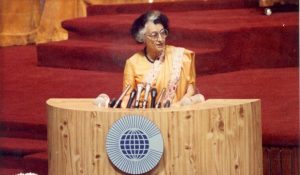Who Was India First Female Prime Minister
Who Was India First Female Prime Minister? Gandhi’s Legacy
Indira Gandhi holds a unique place in Indian and world history. She made history by becoming India’s first female prime minister, leaving an indelible mark on the nation’s political landscape. Indira Gandhi, (born November 19, 1917, in Allahabad, India—died October 31, 1984, in New Delhi), was an Indian politician who was the first female prime minister of India, serving for three consecutive terms (1966–77) and a fourth term from 1980 until she was assassinated in 1984.
https://www.youtube.com/watch?v=ryoMi1VvINA&pp=ygUrV2hvIHdhcyBpbmRpYSdzIGZpcnN0IGZlbWFsZSBwcmltZSBtaW5pc3Rlcg%3D%3D
Early Life and Background
Indira Gandhi’s early life was deeply intertwined with the illustrious Nehru family’s political heritage. Born on November 19, 1917, she was immersed in an environment of political discussions and activism, owing to her father, Jawaharlal Nehru, a towering figure in India’s independence movement and its first Prime Minister. Her education at home under the guidance of a governess fostered her intellectual curiosity. Growing up during India’s struggle for independence, she imbibed a strong sense of duty and responsibility to her nation.
Her marriage to Feroze Gandhi marked her entry into the political sphere, balancing family life with an increasingly prominent role in the Indian National Congress. Her political journey was significantly influenced by her father’s mentorship, and she emerged as a formidable leader, destined to leave an indelible mark on Indian history.
Entry into Politics
Indira’s official entry into politics occurred in 1959 when she was appointed as the President of the Indian National Congress, a significant stepping stone in her political journey. Her leadership skills and ability to connect with the masses soon became evident, and her political career gained momentum.
Prime Ministerial Journey
A seminal juncture in Indira Gandhi’s life arrived with her elevation to the role of India’s Prime Minister in 1966, subsequent to the untimely passing of Prime Minister Lal Bahadur Shastri. This marked the commencement of a transformative phase in her political journey.

Her leadership, marked by astute decision-making and unwavering determination, proved pivotal during a turbulent period. Notably, her resolute handling of the Indo-Pakistani War of 1971, which ultimately led to the creation of Bangladesh, underscored her political acumen and steely resolve. This critical chapter laid the groundwork for what would become an exceptional and impactful tenure as India’s Prime Minister, shaping the nation’s destiny in significant ways.
Challenges and Achievements
Indira Gandhi faced numerous challenges during her time as Prime Minister. She navigated the tumultuous waters of politics, addressing economic issues, and maintaining a delicate balance in foreign relations. Her leadership during the Green Revolution, which transformed India’s agriculture, is considered one of her greatest achievements.
The Emergency Period
One of the most contentious phases in Indira Gandhi’s political career unfolded with the declaration of a state of emergency in 1975. This era witnessed the suspension of civil liberties and a tight clampdown on the press, actions that ignited widespread criticism and protests. However, it’s imperative to contextualize her decisions within a complex political landscape, marked by challenges and confrontations that led to this controversial move. The declaration of the state of emergency remains a subject of intense debate, reflecting the intricacies of the political climate during that period.
Return to Power and Assassination
After a brief hiatus from the Prime Minister’s office, Indira Gandhi returned to power in 1980 and continued to make significant contributions to India’s development. Tragically, her life was cut short when she was assassinated by two of her bodyguards in 1984, marking a dark day in Indian history.
Legacy and Impact
Indira Gandhi’s legacy endures through her contributions to Indian politics, her leadership during challenging times, and her commitment to social and economic progress. She remains an iconic figure, not just as India’s first female Prime Minister but as a symbol of strength and resilience. A Trailblazer for Women in Politics
Indira Gandhi’s most prominent legacy lies in her trailblazing role as India’s first female Prime Minister. In a male-dominated political landscape, her ascent to the highest office in the land shattered gender barriers and inspired generations of women to enter politics. Her leadership sent a powerful message: women could lead nations, shape policies, and confront complex geopolitical challenges with intelligence and determination.

Champion of Social and Economic Progress
During her tenure as Prime Minister, Indira Gandhi placed a strong emphasis on social and economic progress. Her commitment to addressing poverty, improving agricultural productivity, and expanding access to education and healthcare marked a pivotal era in India’s development. The Green Revolution, initiated during her leadership, transformed India from a food-deficit nation to one capable of feeding its growing population.
Foreign Policy and Global Impact
Indira Gandhi’s influence extended far beyond India’s borders. Her foreign policy decisions, particularly during the Indo-Pakistani War of 1971, played a pivotal role in reshaping regional dynamics. The creation of Bangladesh and her ability to secure the release of Pakistani prisoners of war earned her international recognition and cemented India’s position on the global stage.
Conclusion
Indira Gandhi’s life and political career continue to be a subject of fascination, admiration, and debate. Her journey from a young girl born into a politically influential family to becoming India’s first female Prime Minister is a testament to her determination and political acumen. Her legacy lives on, leaving an indelible mark on India’s history and the global political landscape. Visit our website for more interesting information about Messi losangelestimez.com
FAQs
Who was Indira Gandhi?
Indira Gandhi was the first female Prime Minister of India, serving as a prominent political figure from 1966 to 1984. She was a member of the Nehru-Gandhi family, deeply involved in India’s freedom struggle.
What is Indira Gandhi’s legacy?
Indira Gandhi’s legacy encompasses her pioneering role as India’s first female Prime Minister, her commitment to social and economic progress, and her significant influence on global geopolitics.
What were some of her notable achievements?
Indira Gandhi’s achievements include her leadership during the Green Revolution, which transformed India’s agriculture, and her role in the Indo-Pakistani War of 1971, leading to the creation of Bangladesh.
What controversies surrounded her career?
The declaration of a state of emergency in 1975 remains one of the most controversial aspects of her career, characterized by the suspension of civil liberties and press freedom.
How did her family background influence her?
Indira Gandhi’s family, particularly her father, Jawaharlal Nehru, played a significant role in shaping her political aspirations and worldview.
